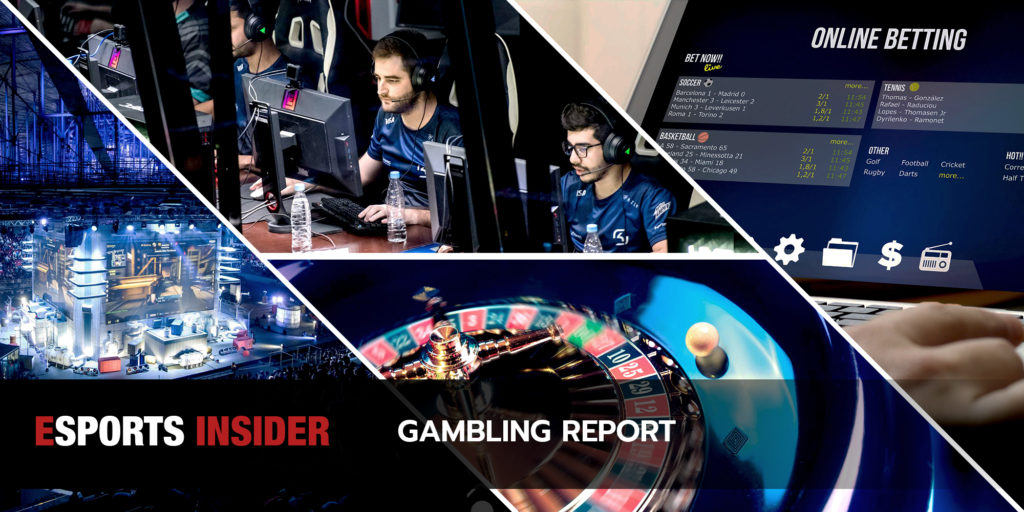The case officially known as Murphy vs. NCAA (previously Christie vs. NCAA) and more informally around the web as the New Jersey sports betting case is finally nearing a long-awaited verdict.
The U.S. Supreme Court is now weighing its decision to either strike down a 25-year old law that will permit regulated sports betting in the United States or disregard the disputation. With an estimated $150 billion (£106,261,500,000) bet on sports in the United States each year – 97% of that being wagered illegally – there’s a lot riding on the pronouncement. If the case goes in favour of the Garden State, esports betting will be a possibility for the United States – currently an unregulated gambling nest. With a decision closing in rapidly, we took a closer examination at how the bill might shape the esports betting market in this edition of the ESI Gambling Report.

The bill
In 1992, a bill known as the Professional and Amateur Sports Protection Act (PASPA) was passed; also known as the Bradley Act, the bill served to curb the spread of sports betting and match-fixing in the United States. However, with a ballooning betting market and a prohibition forcing billions into a shadowy economy where match-fixing is actually more likely, it’s making increasingly more sense to look towards some sort of legislation. That’s what New Jersey is aiming for – a repeal of PASPA that will legalise and regulate sports betting across the country (at each state’s discrepancy), esports included.

Market disrupt
To say the US betting market is massive is nearly an understatement – albeit mostly unregulated – a shift in fully legalising the shady industry will undoubtedly create some form of market disrupt. To fully understand how this may impact the esports betting industry, we spoke to gambling industry analyst, Chris Grove, about what a shift in the U.S. market might look like:

“If the U.S. sports betting market opens to regulated operators, I think you’ll see an acceleration of the current trends in the esports betting industry. We’re already seeing an industry that’s growing, expanding, and maturing rapidly. The ability to access the U.S. market would just pour fuel on the fire…The U.S. is one of the largest unregulated sports betting markets in the world, and the opening of that market to regulated operators has the potential to fundamentally reshape the global gambling industry. It will trigger the development of new technology, new products, mergers and acquisitions – the list goes on.”
By and large, esports betting still only amounts to a small portion of the entire U.S. gambling market; while most states are already placing legislatures into motion ahead of a potential ruling in favor of New Jersey with a larger traditional sport market in mind, esports betting still swaggers some investment worthy qualities. Valued at around $900 million at the beginning of this year, according to Business Insider, odds are the inclusion of the U.S. in the esports betting market would cause this number to snowball, drawing the notice of major brands to potentially roll the dice on the local emerging industry. Grove expanded a bit for us on how companies might be looking to jump on the U.S. market as a hotspot for esports wagering:
“Major traditional bookmakers looking at the U.S. market would probably start to take esports quite a bit more seriously as a way to differentiate their product and appeal to an audience they might not reach otherwise… I think there’s a tremendous amount of interest in esports in America, and there’s obviously a tremendous amount of general interest in betting. If the right brands bring the right wagering products to consumers in the right way, I could see the U.S. quickly becoming one of the leading markets for esports betting by volume.”
Working in tangent
Assuming the ruling goes in favor of New Jersey – leagues, publishers, government and bookmakers will have to bridge relationships with one another in order to sustain a healthy ecosystem for the market to thrive in. Outside of esports, the case has prompted the NBA and MLB to propose an ‘integrity fee’ that would tax handle the total wagers from bettors going through the sportsbooks payable to each league. Although rumored this number could be as low a 0.25%, there has already been some foreseeable resistance to the idea of implementing any such tax. The position stands however, that all entities involved must be able to work together in tangent to ensure its smooth operation; for this reason, we decided to reach out to Chief Marketing Officer at Rivalry.gg, Kevin Wimer, on his stance on integrity fees in a regulated betting market:

“As a bookmaker, we’d be fine with game publishers receiving a percentage of revenue from wagering. If betting sites can work together with publishers to promote safe and responsible betting, a world in which we work together makes a lot of sense. Working together is a vital part of ensuring that professional esports continues to have integrity. Sportsbooks play an integral part in being able to detect irregularities in the integrity of a match.”
Integrity is at the core of PASPA, prompting its initial inception – worries of match-fixing has caused leagues to shut down any attempts to legalise sports betting in the United States in the past. However, as Wimer mentioned, integrity is a crux for bookmakers as well; betting platforms don’t exist by shelling out millions of dollars to consumers, therefore, a problem with match integrity is a big problem for sportsbooks as well. If the two organisms can service each other towards solving that issue, they’ll ultimately stand a better chance at curbing its existence.
What lies ahead?
All in all, a legalised and regulated esports betting market should serve as a favorable outcome for the pro-gaming industry. Aside from generating an estimated 125,000 jobs and $4 billion (£2,833,400,000) in tax revenues as an upshot from a New Jersey favored-ruling – esports as a whole will undoubtedly prosper as a byproduct of its betting facet expanding into the United States. Kevin Wimer briefly touched on this notion for us:
“Yes, we believe that if and when companies are able to legally offer betting to US citizens, the esports scene will thrive. There will be more revenue to go around to help support the entire scene from the ground up.”

An increase in revenue alongside a possible and justifiable integrity fee is likely to reap some long-term benefits for esports. The influx in capital from wagering can be used to solve problems in the esports infrastructure: for example, building platforms and systems for players to blossom in, without jeopardizing their financials. The ruling however, could see a dicey overlap between regulated and unregulated skin gambling markets – creating a discord between the two. Overall, once sorted, Wimer believes this will give room for the scene to grow:
“There will certainly be an increase in market size but more importantly, there will be a shift from unregulated gambling to regulated gambling. This may cause some friction for some users when compared to current unregulated skins gambling but overall should help the space mature… The unregulated handle is reported to be massive. If the same users did not have to worry about having their funds lost to overseas accounts, they would likely use licensed responsible book makers.”
While there’s no hard deadline for when the Supreme Court will come to announce its decision on the case, there is reason to believe it could be as early as April or as late as June. Regardless, we’ll be sure to keep you informed regarding the status of the case.

